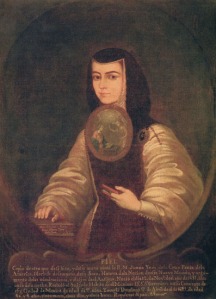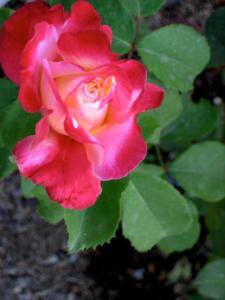sometimes roses speak to us in homilies
with a nod to Sor Juana Inés de la Cruz
her story and her poem are below my poem
January is on the wane
leaving behind early dark and champagne hopes
for the genus Rosa. Wild or tame, they’re lovely.
Garden roses need pruning, solicitous cultivation ~
Layer shorter under taller, drape on trellises
and over pergolas, the promise of color and fragrance,
climbers retelling their stories in ballet up stone walls,
an heirloom lace of tea roses, a voluptuous panorama
rhymed with shrubs and rock roses in poetic repetition.
Feminine pulchritude: their majesties in royal reds
or sometimes subdued in pink or purple gentility,
a cadmium-yellow civil sensibility, their haute couture.
Is it the thorned rose we love or the way it mirrors us
in our own beauty and flaw and our flow into decrepitude?
They remind of our mortality with blooms, ebbs, and bows
to fate, a noble death to rise again in season, after Lazarus.
Divinely fulsome, the genus Rosa, sun-lighted reflexed ~
And January? January is ever on the wane.
– Jamie Dedes
© 2013, poem and photograph, Jamie Dedes, All rights reserved
I’ve posted this poem before but not with its backstory.

The work that was the jumping off point for my poem is one by the Mexican nun, Sor Juana Inés de la Cruz (1551-1695), who lived during the time when Mexico was a part of the Spanish empire. She belonged to the Order of St. Jerome.
Sor Juana was a writer, playwright and a Baroque poet. She was hungry for learning and was self-educated. From childhood, she set her own demanding educational goals. These three famous quotes of hers are telling:
“I don’t study to know more, but to ignore less.”
“One can perfectly well philosophize while cooking supper.”
“…for there seemed to be no cause for a head to be adorned with hair and naked of learning…”
I am enamored of Sor Juana’s work and find her life interesting. She was brilliant, independent and nonconforming.
Here is her poem Rosa in Spanish and in English.
Rosa divina que en gentil cultura
eres, con tu fragrante sutileza,
magisterio purpureo en la belleza,
enseñanza nevada a la hermosura.
Amago de la humana arquitectura,
ejemplo de la vana gentileza,
en cuyo ser unió naturaleza
la cuna alegre y triste sepultura.
¡Cuán altiva en tu pompa, presumida,
soberbia, el riesgo de morir desdeñas,
y luego desmayada y encogida
de tu caduco ser das mustias señas,
con que con docta muerte y necia vida,
viviendo engañas y muriendo enseñas!
Rose, heaven’s flower versed in grace,
from your subtle censers you dispense
on beauty, scarlet homilies,
snowy lessons in loveliness.
Frail emblem of our human framing,
prophetess of cultivation’s ruin,
in whose chambers nature beds
the cradle’s joys in sepulchral gloom.
So haughty in your youth, presumptuous bloom,
so archly death’s approaches you disdained.
Yet even as blossoms soon fade and fray
to the tattered copes of our noon’s collapse –
so through life’s low masquerades and death’s high craft,
your living veils all your dying unmasks.
– Juana Inés de la Cruz
Illustration and poem in the public domain. Source of translation unknown.


Lovely poems, both. Sor Juana seems to be a very interesting person and read. Thanks for the heads up. 🙂
LikeLike
You are welcome, Imelda. 🙂
LikeLike
Lovely piece, Jamie. The rose is a quintessential symbol of beauty in our lives, in fact, at a time when I find myself increasingly weighted down by the horrors and injustice amongst sections of humanity, I am reminded of the need to rejuvenate my appreciation of the beauty in everything and anything … and I absolutely love and totally appreciate all three quotes by Sor Juana.
LikeLike
I feel the same way and appreciate your comment. If you’ve not read more of Sor Juana or more about her life, I recommend that you do. I think she is someone you would take joy in knowing.
LikeLike
Thank you, Jamie, I will do that.
LikeLike